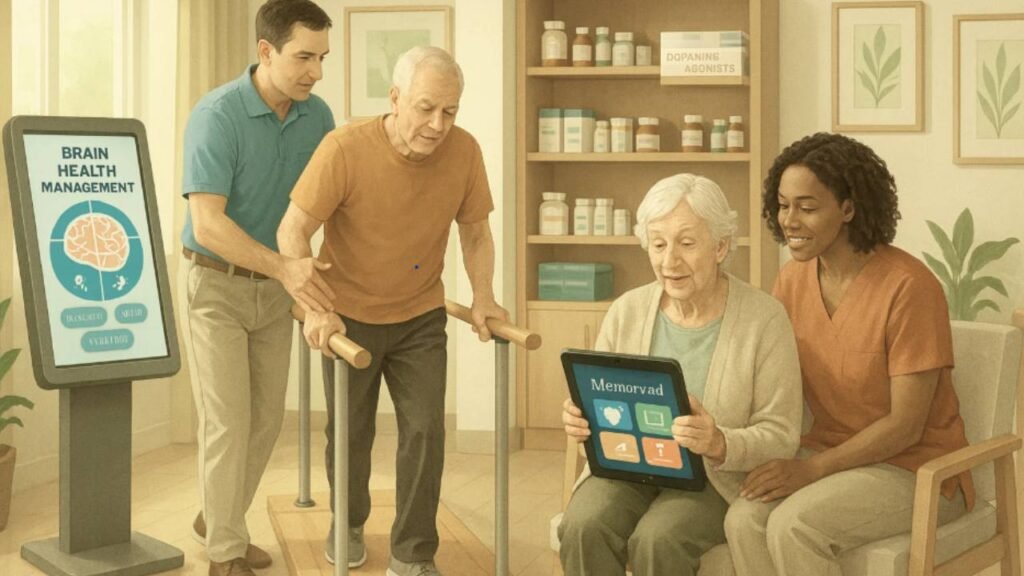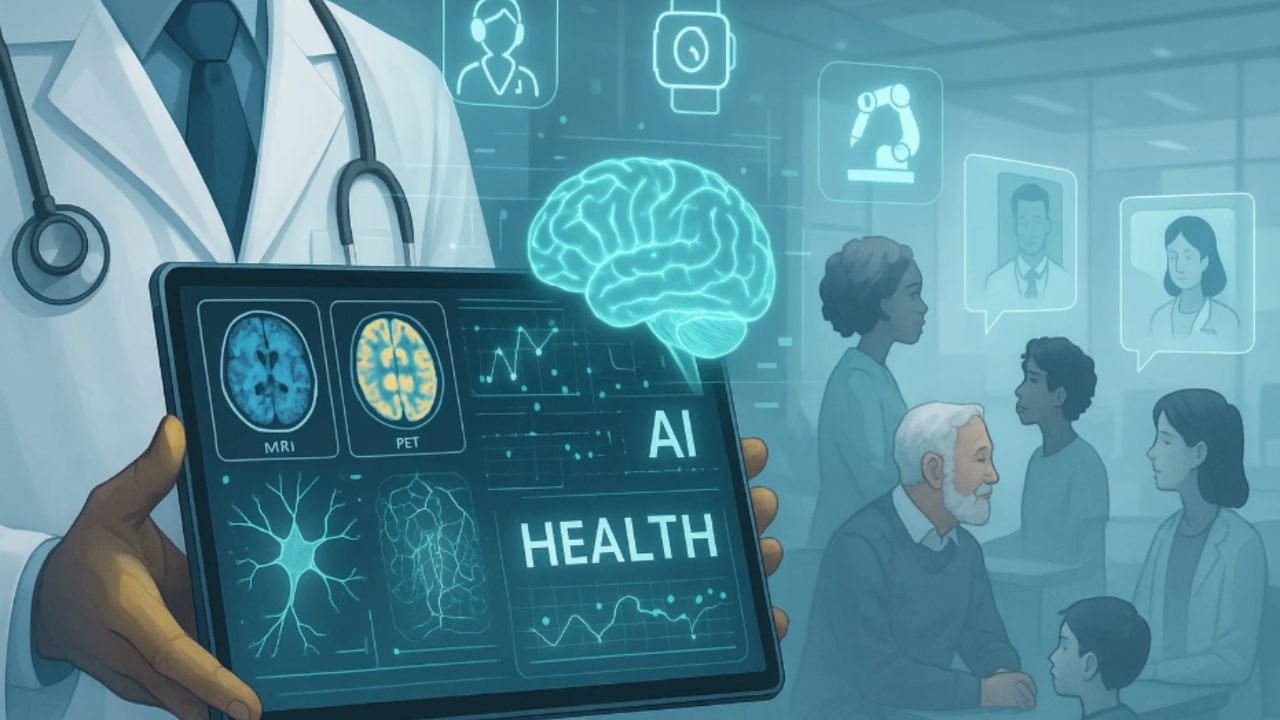The landscape of neurological healthcare is rapidly evolving, driven by technological breakthroughs that are transforming diagnosis, treatment, and patient care pathways. Platforms like doctorhub360.com, neurological diseases are at the forefront of this revolution, providing comprehensive, tech-driven resources that empower both patients and medical professionals.
This guide dives deep into neuromuscular and neurological diseases, explores the latest technologies in diagnosis and therapy, and highlights how doctorhub360.com is shaping the future of neurological care.
Table of Contents
Unveiling the World of Neurological Diseases
Neurological diseases represent one of the most challenging aspects of modern medicine, affecting the brain, spinal cord, peripheral nerves, and neuromuscular junctions.
Understanding Neurological Conditions
Neurological disorders impact millions worldwide, encompassing a broad spectrum of conditions affecting the brain, spinal cord, and peripheral nervous system. Also referred to as neuromuscular diseases when involving muscles and motor neurons, these illnesses often bring progressive loss of function that affects cognition, movement, sensation, and autonomic nervous control.
Some neurological disorders present acutely, like stroke, requiring immediate intervention, while others, such as Alzheimer’s or Parkinson’s disease, evolve gradually over years or decades. Severity can vary widely, from mild cognitive disturbances to severe physical disabilities.
Understanding these diseases’ nature, symptoms, and progression is essential for effective management and optimal outcomes.
Categorizing Common Neurological Diseases
Modern medicine recognises numerous types of neurological conditions, each with distinct characteristics and treatment approaches.Here is an overview of major neurological diseases, summarized with key symptoms and descriptions to aid neurological disorder diagnosis.
Primary Categories and Symptoms
| Disease | Symptoms | Description |
| Alzheimer’s Disease | Memory loss, confusion, difficulty focusing | A progressive neurodegenerative disease affecting cognitive function and daily activities |
| Parkinson’s Disease | Tremors, rigidity, and slowed movement | A chronic movement disorder affecting motor control and sometimes cognitive health |
| Multiple Sclerosis | Numbness, visual disturbances, poor coordination | Autoimmune-mediated demyelination causes varied neurological symptoms |
| Epilepsy | Seizures, loss of consciousness | Characterized by recurrent seizures due to abnormal brain electrical activity |
| Migraines | Severe headaches, nausea, light sensitivity | Neurological disorder causing recurring headaches with sensory disturbances |
Other conditions include stroke, Huntington’s disease, motor neuron disease, and Guillain-Barre syndrome.
Additional Neurological Conditions
Other significant neurological conditions include stroke treatment options, Huntington’s disease, motor neuron disease, Guillain-Barre syndrome, and spinal muscular atrophy. Each condition requires specific diagnostic approaches and treatment protocols.
The diversity of neurological conditions emphasises the importance of platforms like doctorhub360.com, neurological disease resources, which provide comprehensive information and support for patients and families navigating these complex conditions.
The Expanding Role of Technology in Neurological Care
Technology has become a driving force in transforming every aspect of neurological disease management and patient care delivery.
Telemedicine Revolution
Telemedicine, a form of healthcare, allows for phone consultations with neurologists, providing a convenient solution for patients in remote areas. This technology not only enhances accessibility but also ensures continuity of treatment, thereby enhancing the quality of care provided to patients.
Advanced Diagnostic Capabilities
PET scans and MRI are advanced imaging technologies used for early detection, enabling healthcare providers to identify subtle changes before symptoms fully develop. Artificial intelligence and machine learning enable pattern recognition and risk assessment, supporting early intervention strategies.
Digital health records facilitate seamless sharing of patient data among specialists, enhancing accuracy and decision-making across care teams, reducing errors and improving patient outcomes.
Trends in Early Detection, Diagnosis, and Treatment
Smart systems and innovative research are continuously reshaping diagnostic and treatment pathways for neurological conditions.
Advanced Neuroimaging
Functional MRI, diffusion tensor imaging, and emerging biomarkers provide earlier and more precise diagnoses of conditions like Multiple Sclerosis, Care requirements and cognitive impairment patterns.
Electroencephalography (EEG) technology has advanced significantly, aiding in detecting epilepsy monitoring needs and other seizure disorders with greater accuracy and reliability.
Artificial Intelligence Integration
AI integration aids in provider decision-making, enabling efficient diagnostics and treatment planning. It can identify patterns not immediately apparent to human observers, enhancing therapy selection for complex conditions. Personalized medicine approaches, utilizing genetic profiling, enhance therapy selection.
These technologies, combined with platforms like doctorhub360.com’s neurological diseases services, create comprehensive care ecosystems benefiting both patients and healthcare providers.
Comprehensive Treatment Options and Daily Living

Managing neurological diseases requires multifaceted, patient-centred approaches that address both medical needs and quality of life considerations.
Main Treatment Modalities
Dopamine agonists are essential medications for specific conditions, including migraine preventives. These medications are tailored to meet patient needs and require specialized expertise.
Surgical interventions like deep brain stimulation and tumor resection require specialized neurosurgery specialists. Physical and occupational therapy promotes functional independence and manages muscle spasticity, helping patients adapt to chronic changes and maintain a high quality of life.
Daily Living Strategies
Strategies for cognitive support include adaptive devices, mental health services, and community resources that enhance quality of life for patients and their families. These comprehensive approaches address the full spectrum of patient needs.
Brain Health Management extends beyond medical treatment to include lifestyle modifications, social support systems, and educational resources that empower patients to participate actively in their care.
Breakthroughs and Latest Therapies in Neurology
The field of neurology continues to advance rapidly, with innovative treatments and therapeutic approaches emerging regularly.
Cutting-Edge Treatment Developments
Multiple Sclerosis Care has seen revolutionary progress with the integration of molecular biomarkers that allow for earlier diagnosis. Current therapies emphasize remyelination and neuroregeneration, with exciting research ongoing into CAR-T cell therapy and advanced immunotherapies aiming to restore neurological function.
In the realm of epilepsy monitoring, treatments have expanded to include new antiepileptic drugs as well as advanced neurostimulation devices such as vagus nerve stimulators and responsive neurostimulation systems. Additionally, dietary strategies like ketogenic therapy and gene-based treatments are being explored for patients with drug-resistant epilepsy.
Management of migraines has improved substantially with the development of monoclonal antibodies and neuromodulation devices, offering new hope to patients suffering from chronic and refractory headaches.
Table 1: Latest Neurological Treatment Innovations and Patient Benefits
| Treatment Category | Innovation | Patient Benefits |
| Multiple Sclerosis | Remyelination therapy | Improved neurological function |
| Epilepsy | Responsive neurostimulation | Reduced seizure frequency |
| Parkinson’s Disease | Advanced DBS systems | Better motor control |
| Stroke | Mechanical thrombectomy | Improved recovery outcomes |
| Alzheimer’s Disease | Amyloid-targeting therapy | Potential cognitive preservation |
Source: International Neurological Research Consortium
Emerging Therapeutic Approaches
Stroke treatment options have notably expanded with the advent of mechanical thrombectomy procedures, which physically remove clots and drastically improve patient recovery rates. These, combined with advanced rehabilitation techniques, mark a significant step forward in emergency neurological care.
Furthermore, neurological symptom assessment has become increasingly sophisticated, leveraging digital platforms and remote monitoring tools. This real-time, continuous evaluation allows healthcare providers to track disease progression accurately and tailor treatments dynamically.
Table 2: Epilepsy Medication Overview
| Medication | Typical Cost/mo | Main Benefits |
| Levetiracetam | $40–$100 | Broad efficacy, favourable side effects |
| Valproic Acid | $30–$60 | Effective for various seizure types |
| Lamotrigine | $25–$75 | Suitable for combination therapy |
| Topiramate | $25–$80 | Also aids in migraine prevention |
Source: Neurology Today Journal
This combination of novel therapies, advanced devices, and digital health tools is transforming the care landscape for neurological diseases, making early intervention more effective and improving quality of life for patients worldwide.
DoctorHub360.com: Technology at the Heart of Care
The platform doctorhub360.com’s neurological diseases services have established itself as a leader in technology-enabled neurological healthcare delivery.
Platform Features and Capabilities
AI-powered diagnostic support provides valuable assistance to both doctors and patients in understanding complex neurological conditions. The platform serves as a centralized resource hub offering trusted information, virtual consultations, and comprehensive symptom checkers.
Streamlined appointment booking and digital health record access eliminate traditional barriers to care while ensuring that patients can easily connect with appropriate specialists. The platform facilitates seamless communication between patients and healthcare providers.
Patient Empowerment and Education
The platform empowers patients through engagement and education, providing access to current research, treatment options, and support resources. This educational approach helps patients make informed decisions about their care.
Support for early detection, advanced monitoring, and efficient follow-up care ensures that patients receive timely and appropriate interventions. The platform serves as a bridge across specialties for complex neurological cases requiring multidisciplinary approaches.
Why Choose DoctorHub360.com
Up-to-date resources curated by experienced neurologists ensure that patients and healthcare providers have access to the latest information and treatment protocols. The platform’s commitment to integrating telemedicine, digital records, and AI creates comprehensive neurological support systems.
The doctorhub360.com neurological diseases platform demonstrates how technology can democratize access to specialized care while maintaining the highest standards of medical expertise and patient safety.
The Road Ahead: Future of Neurological Disease Management
The future of neurological care promises continued innovation and improved outcomes for patients worldwide.
Technological Advances on the Horizon
AI and big data analytics will continue to refine early diagnostic tools and personalized therapy selection, making neurological disorder diagnosis more accurate and efficient. These technologies will enable healthcare providers to identify conditions earlier and develop more targeted treatment approaches.
Wearables and remote sensors will enable real-time monitoring of neurological conditions, facilitating prompt intervention and improved treatment adherence. These devices will provide continuous data streams that help optimize therapy and prevent complications.
Regenerative Medicine and Genomics
Genomic medicine and regenerative therapies are revolutionizing neurodegenerative diseases by managing symptoms, restoring function, and slowing disease progression. Digital platforms like doctorhub360.com are evolving to create holistic care pathways and support communities for patients and families affected by neurological conditions.
“Digital transformation isn’t just about technology; it’s about changing how organizations operate and deliver value to customers in fundamentally new ways.”
George Westerman, Leading Digital, 2014.”
YOU MUST NEED TO READ: Wunonovzizpimtiz: The Breakthrough Shaping Tomorrow
Wrapping Up:
Technological innovation has significantly transformed neurological disease management, making specialized care more accessible and improving diagnostic accuracy. Platforms like doctorhub360.com offer comprehensive telemedicine services, integrating advanced neuroimaging, AI-powered diagnostics, and traditional medical expertise.
The future of neurological care promises even greater improvements, as digital health platforms evolve alongside genomic medicine and regenerative therapies. The success of these platforms demonstrates the importance of integrating cutting-edge technology with compassionate, expert medical care, ensuring patients receive comprehensive support to navigate neurological disease challenges and maintain hope for future treatment and cure.
Frequently Asked Questions
1: How does doctorhub360.com improve neurological diagnosis?
The platform integrates AI with expert neurology to support early detection and personalized diagnosis.
2: What stroke treatment options are facilitated by doctorhub360.com?
Doctorhub360.com connects patients with telemedicine-enabled stroke specialists providing timely intervention recommendations.
3: Can doctorhub360.com assist in epilepsy monitoring?
Yes, through remote monitoring tools and symptom tracking apps integrated within the platform.
4: What are the benefits of digital health records in neurological care?
They enhance data accuracy, coordination between specialists, and allow tailored treatment planning.
5: Is doctorhub360.com suitable for complex neurodegenerative disease management?
Absolutely; the platform offers resources and access to multi-disciplinary teams specializing in conditions like Parkinson’s and Alzheimer’s disease.

